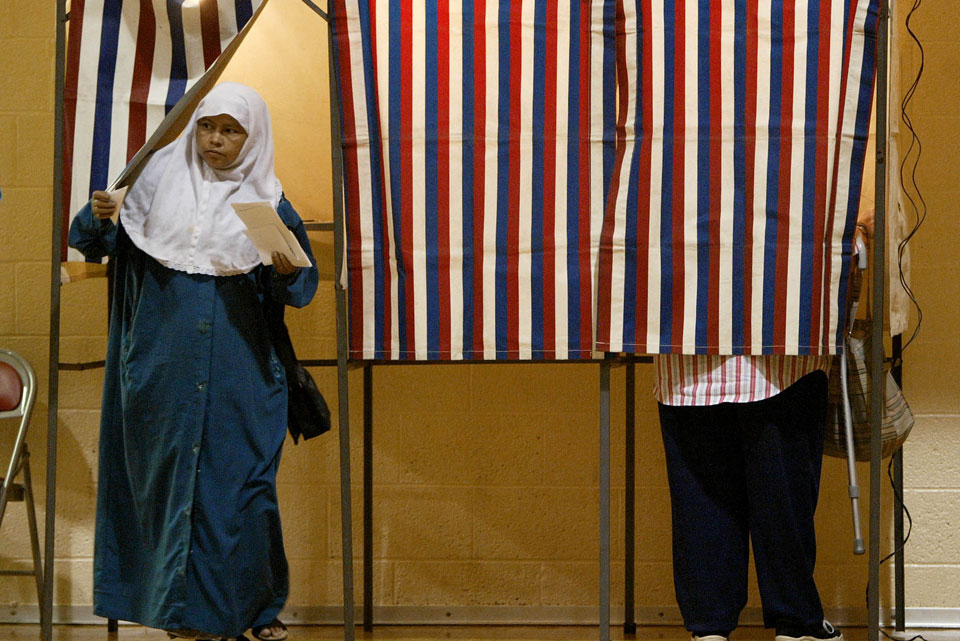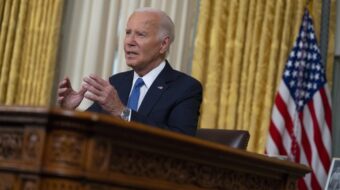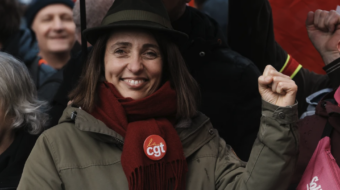
DETROIT—Republican Lawmakers in Michigan have begun a petition drive to get around Gov. Gretchen Whitmer’s veto of 39 bills that were introduced in the state’s House and Senate in order to restrict voting rights. The focal point of some recently passed bills is to introduce stricter rules around ID requirements for those who vote in person.
The Republicans’ reasoning behind these bills is allegedly to “restore faith in elections,” but state Democrats and voting rights activists argue these bills would further disenfranchise voters and are a reassertion of Jim Crow-era laws.
For Our Future Michigan hosted a panel discussion online recently to discuss the petition drive. The panel included Secretary of State Jocelyn Benson, Oakland Forward Executive Director Kermit William, Michigan State Director of the Human Rights Campaign Amritha Venkataraman, and life-long United Auto Workers union member Sam Stark.
Benson stated that the efforts of the state Republicans are to create “challenges in reaction to enormous success ” of Democrats, citing the results of recent elections—most notably the election of 2020. She went on to argue that the truth of last year’s election was that “people in Michigan on both sides of the aisle want to vote from home.”
Fielding a question from moderator Mari Rymar regarding why the GOP is taking these actions and making claims of voter fraud and a lack of election integrity, Benson replied, “What this is about…is the massive amount of voter turnout and to ensure we can’t replicate that again..” She went on to bring up the example of Proposal 3, which made “democracy more accessible” by offering multi-lingual election materials, tackling accessibility issues, and offering automatic voter registration. Benson concluded by stating, “Democracy is a team sport; it requires all of us working together.”
The arguments of other panelists centered around the racism built into the Republicans’ proposed voter restrictions. Stark of the UAW argued that the main message today is for the working class to take up the fight, and he noted that Black voters are the “main target” of the Republicans’ restrictions. He went on to state that “there’s nothing Black people are fighting for that doesn’t include working-class whites.”
Williams put it even more bluntly by stating, “Black people saved this country in the last election. Brown people saved this country in the last election… Black people had an easier time voting during Reconstruction than we do right now.”
Last year’s record-breaking voter turnout appears to have changed many people’s views around elections, but Venkataraman, in an effort to allay these fears and cynical attitudes, said, “People wouldn’t be working really, really hard to take [your vote] away if it didn’t matter.”
Stark also said the fight to protect voting rights extends into many other struggles. “This isn’t just a battle for democracy but also economic fairness,” he said, hinting at the Michigan Democratic Party Platform’s points on addressing fairness in the tax system and disparities in wealth.
Before the webinar ended, Williams left the audience with a call to action: “I’m asking you today to get active and get inconvenient about what you’re doing.”
This call to “get inconvenient” recalls the recent primary in Buffalo, N.Y., where India Walton, a self-declared socialist candidate, came out on top. Walton’s win is being called into question through “investigations” and an attempt to have the city manager replace the position of city mayor, who would be elected by Buffalo’s Common Council.
Although not all council members agree with this possibility, representing the people of Buffalo does not appear to be a question of the good Democrats versus evil Republicans, as the council is dominated by Democratic members. Buffalo resides in Erie County, which has a Democratic Caucus almost double the size of its Republican Caucus.
Through examples like this, recent voter turnouts tend to speak less to faith in Democrats and more to discontent and dissatisfaction with the two-party system and economic disparity. There is a “growing socialist tendency” in the beliefs of the 47% of Americans who think the political system needs major changes. With examples of GOP voter restriction bills and Democratic efforts to block socialist candidates from winning positions in government, democracy is sometimes being undermined from both sides of the aisle.
Benson’s claims of “success” in recent elections run against Williams’s call to “get active and get inconvenient” here: In a lot of cases, the people’s desires are becoming more inconvenient to both Republicans and Democrats.












Comments